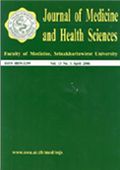Impact from Unrest Situations in the Southernmost Provinces on Stress and Coping, Quality of Life and Nursing Administration as Perceived
Keywords:
unrest situation, perceived stress, coping methods, quality of life, nursing administrationAbstract
The purposes of this descriptive research were to study the impact of the unrest situations in the southernmost provinces of Thailand on: 1) the stress of nurse administrators; 2) their methods of coping with the stress; 3) the effect on their quality of life; and 4) the impact on nursing administration. The sample consisted of a group of 72 nurse administrators in the southernmost provinces. The instrument used in this study was a questionnaire consisting of five parts. Part 1 collected demographic data; part 2 surveyed stress; part 3 examined how the participants coped with the stress; part 4 surveyed the quality of life of the participants; and part 5 was a focus-group interview regarding the nursing administration process. The data of parts 1 to part 4 were collected by self-report questionnaires, and were analyzed by frequency, percent, mean, and standard deviation; while the data for part 5 were obtained by eight focus-group interviews with 45 out of 72 nurse administrators, and were analyzed by content analysis. The results showed that a majority of the sample perceived overall stress, coping with the stress, and quality of life to be at moderate levels. The themes that emerged from the focus-group interviews reflected both pros and cons of nursing administration. Nurse administrators can use them as a guide for modifying nursing management skills in order to provide effective care despite the limited resources and pressures in these southernmost provinces.



